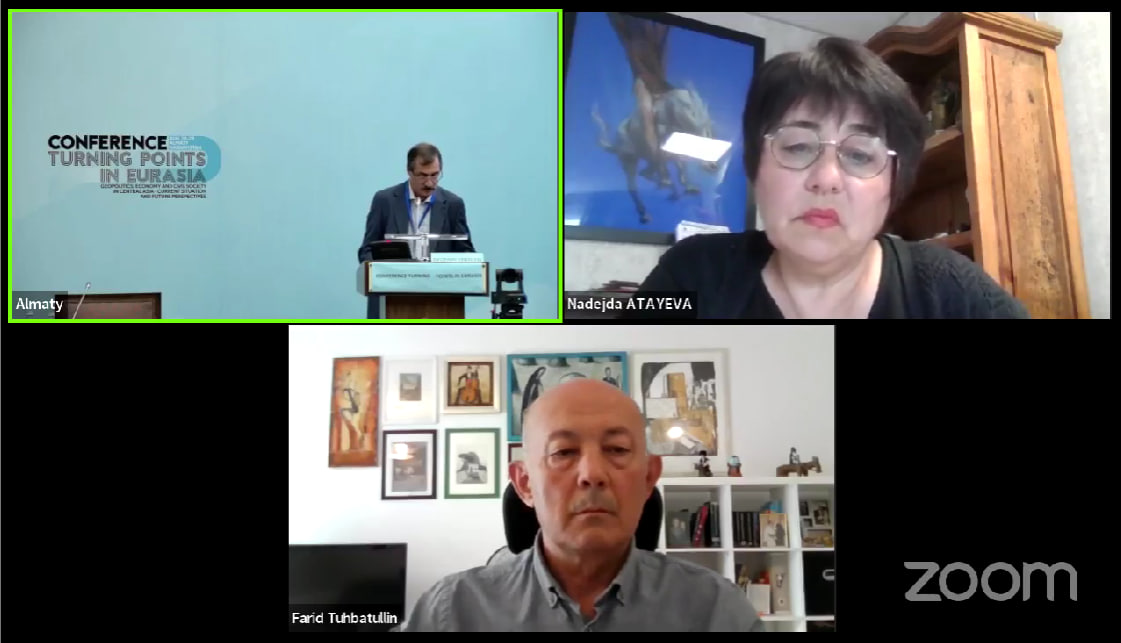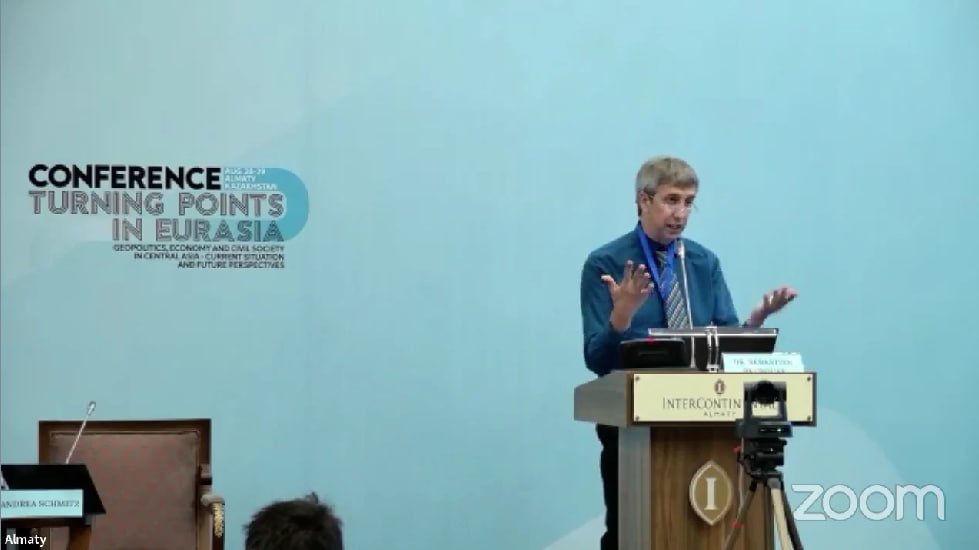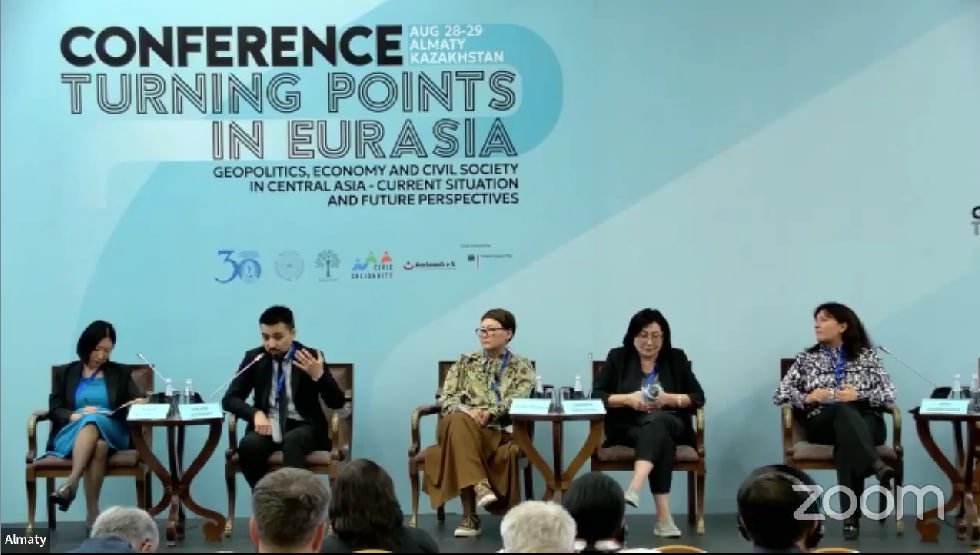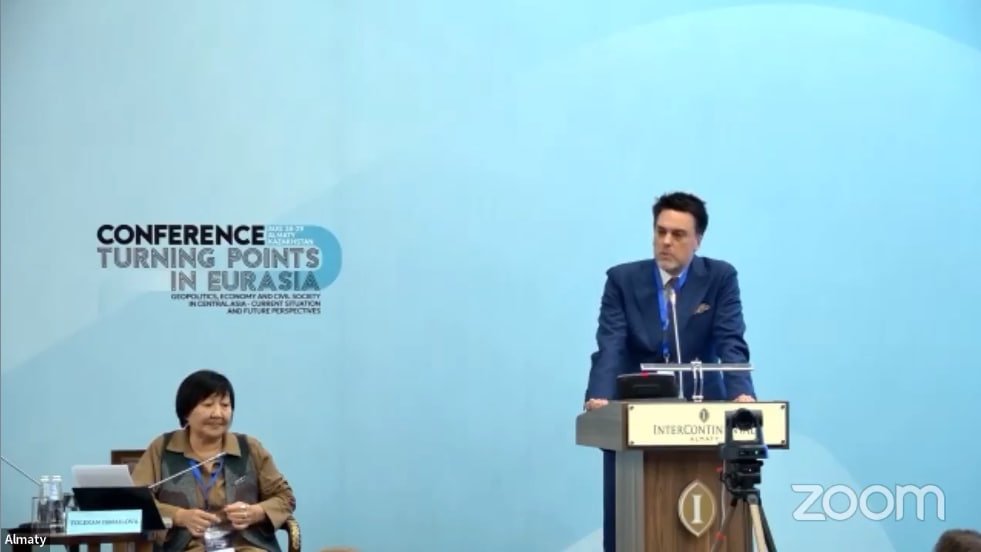Civil Society’s Future in Central Asia Discussed
 coverphotocollage Orda.kz
coverphotocollage Orda.kz
A two-day international conference on human rights was held in Almaty with the assistance of the German Foreign Ministry. The reason for its holding was the 30th anniversary of the Kazakhstan International Bureau for Human Rights (KIBHR). Orda covered what local and international experts talked about at the conference.
The conference’s them - “Turning points in Eurasia: Geopolitics, economy and civil society in Central Asia – the current situation and prospects for the future.” More than 200 experts attended the meeting. They touched upon three main issues: the impact of Russia's war against Ukraine on Central Asia, trends in political development and the evolution of human rights in the region.
23 out of 100
Yevgeny Zhovtis, Director of the Kazakhstan International Bureau for Human Rights (KIBHR), who organized the international meeting, believes that the human rights situation in Kazakhstan and in Central Asia as a whole depends on domestic political and geopolitical contexts.
For many years we have been living and living in unfree countries with consolidated authoritarian regimes. The only country in the region, Kyrgyzstan, which for some time was considered free and an island of democracy, is now characterized as unfree. The Central Asian region is in a very difficult environment: two major autocracies - Russia and China.

Evgeny Zhovtis / Screen of the online broadcast of the conference
Yevgeny Zhovtis added that, according to Freedom House, the level of freedom in Kazakhstan is 23% out of 100, thus characterizing the country as not free. Among the Central Asian nations, only Kyrgyzstan outpaces Kazakhstan. The Kyrgyz Republic’s freedom level is 27%.
According to Zhovtis, the statistics reflect reality.
The political opposition, independent trade unions, independent media, journalists and bloggers, human rights organizations, and civil activists are considered by the authorities of the countries of the region either as enemies in general, or as potentially suspicious elements requiring special control by security agencies. Almost all legislation regulating these spheres of public life in the countries of the region is repressive and is not based on a presumption in favor of law.
The expert added that as long as the existing post-Soviet political regime persists in these countries, human rights and freedoms will always be hostages of the domestic political context.
Development of Civil Society
The reports of political scientists discussed the need to strengthen civil society in the region for its liberalization. Sebastian Peyrouz, PhD and researcher of the Central Asian region, said that the authorities of all five Central Asian countries keep civil society under complete control.
The leaders of the region promised to develop civil society. But little has changed since the 1990s. Despite the fact that the Central Asian countries are different, as well as their legal systems, all five countries share full control over civil society. The authorities restrict freedom of speech, strengthen control over social networks, restrict the rights of citizens to unite, and persecute activists who raise issues with a political background. This causes concern, the expert says.
 Sebastian Peyrouz / Screenshot of the online broadcast of the conference
Sebastian Peyrouz / Screenshot of the online broadcast of the conferenceKazakhstani political scientist, Dimash Alzhanov, believes that the regional authorities have eliminated opponents, thereby creating a cycle of instability in the countries.
Politics, if it pursues the support of civil organizations, first of all, should not eliminate the political opposition. After all, its destruction creates a cycle of instability. This approach is not viable in the long term. The support of civil society should go directly with the protection of the political space. If this does not happen, then the discourse will be at the level of a swamp: some pretend to support civil society, while others pretend that it is somehow developing.
 Dimash Alzhanov / Screen of the online broadcast of the conference
Dimash Alzhanov / Screen of the online broadcast of the conferenceAccording to Alzhanov, the level of civil organizations’ development does not allow society to adapt to serious political crises, such as Bloody January in Kazakhstan and coups in Kyrgyzstan.
What happened last year is the inevitability faced by post–Soviet authoritarian regimes. At the moment, when such a crisis occurs, society has neither parties nor civil organizations to direct any political change in a positive direction. If this trend continues, there will inevitably be bloodshed and a change of power – something that we notice in Kazakhstan and Kyrgyzstan.
Ongoing USSR Collapse
Robin Wagener, a member of the German Bundestag and coordinator of the Ministry of Foreign Affairs with Central Asia, in his speech drew attention to the fact that, although many believed that the war would be a turning point for Central Asian countries, Russia's influence persists in the region.
Russia's aggressive war against Ukraine creates a dangerous precedent, especially for Russia's closest neighbors. Moscow is still exercising its power. This was vividly observed on May 9, when the leaders of all five countries of the region arrived at the parade on Red Square at Putin's request. Despite the diversification of international relations, the war in Ukraine has not become a turning point in relations between Central Asia and Russia, as many had hoped, Wagener said.
 Robin Wagener / Screenshot of the online broadcast of the conference
Robin Wagener / Screenshot of the online broadcast of the conference
Political scientist Arkady Dubnov does not agree with the opinion of the German deputy. In his opinion, the war in Ukraine accelerated the formation of Central Asia as a separate subject of world politics and forced countries to distance themselves from Russia.
The collapse of the Soviet Union is still ongoing. The next stage of disintegration began on February 24, 2022 with the beginning of the Russian invasion of Ukraine. Now we are witnessing the political transformation of the ruling regimes in the countries of the Central Asian region, which makes them independent political factors. The consequence of this is the detachment of the countries of the region from the orientation towards the former Soviet metropolis, Moscow, and to the reduction of Russian influence. This factor is superimposed on the deep disappointment of the capitals of Central Asia in relation to Russia and the unwillingness to associate their countries with it, as this deprives Central Asia of freedom of choice in foreign policy, with all the ensuing consequences: denial of access to foreign investments, modern technologies, and so on,” the expert said.
 Arkady Dubnov / Screen of the online broadcast of the conference
Arkady Dubnov / Screen of the online broadcast of the conferenceArdakiy Dubnov also called the geopolitical picture of Central Asia “fluid and uncertain”, Adding that its future will depend on how the war in Ukraine ends.
The weakening of Russia's traditional influence in Central Asia naturally leads to the replacement of this influence by a decisive increase in the Chinese presence and the strengthening of Türkiye's ideological influence, as well as the growing interest in the region from the Persian Gulf monarchy. In the short term, such a policy is justified, as long as imperial trends prevail in the current regime of Russia. However, in the long term, this is fraught with a boomerang effect and may contribute to anti-Western sentiment in the region. Russia should not look like a hostile country for Central Asia in the future. The geopolitical picture of Central Asia seems fluid and uncertain, the expert concluded.
He also added that the region's countries need to carefully analyze Russia's development, which has led it to a historical impasse.
Original Author: Silam Aqbota
DISCLAIMER: This is a translated piece. The text has been modified, the content is the same. Please refer to the original piece in Russian for accuracy.
Latest news
- Kazakh-Russian Border Sees Truck Congestion Amid Summer Traffic Surge
- Kyrgyzstan: Authorities Uncover Official Forgery at I. Arabaev University, Expel Dozens of Foreign Students
- Kazakhstan's Special Forces Join Multinational Anadolu-2025 Drills in Türkiye
- Relative of Former Akim Danial Akhmetov Temporarily Appointed to Head Kazakh Railways
- Audit Chamber Stands by Findings Amid Dispute with Health Ministry
- Authorities Detain Seven in Sputnik Azerbaijan Investigation
- Foreigners in Russia Facing SIM Card Blocking Over Biometrics Rules
- Petropavlovsk Blogger Sentenced to 3.5 Years for Ethnic Discord
- Toqayev Discusses Challenges and Priorities with SCO Secretary-General
- Kazakh Ambassador Confirms Attendance at Kadyrov Son’s Wedding
- Bektenov Criticizes Ministry of Water Resources Over Project Delays
- China Eastern Airlines Launches Direct Flight from Shanghai to Almaty
- Black Market for Water: Why Fields Lack Water in Kazakhstan — and Who’s to Blame
- Former Vice Minister of Labor Akmadi Sarbasov Detained
- Quest Pistols Concert in Astana Reportedly Cancelled
- Former Director and Accountant of Elite Astana School Accused of Embezzling Over 900 Million Tenge
- Explosion Hit Vilamoura Tanker: Energy Ministry Says Kazakh Oil Wasn’t On Board
- “Someone Who Was Rejected by Everyone — Except You”: The Lukas Shelter Rescues Forgotten Animals
- Wife of Convicted Police Chief Under Investigation
- Kazakhstan: Ten Regions Achieve Full Water Supply Coverage, Says Minister

